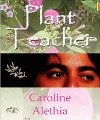 Plant Teacher by Caroline Alethia
Plant Teacher by Caroline Alethia
Publication date: 7 January 2012
Published by: CreateSpace
298 pages
ISBN-13: 978-0-9814942-9-6
The story in a nutshell: Three Americans search for their own destinies in La Paz as political clouds gather over Bolivia in late 2007 and early 2008.
Martin Banzer, fresh from college, hopes to create literature as he wrestles drug-induced hallucinations, his extended (and meddling) family, and the revelations being unveiled as he reads the diary of his recently deceased father who, in his own youth, migrated from Bolivia to the U.S.
Cheryl Lewis, also a recent grad, has signed on with a non-governmental organization (NGO) working with street kids in La Paz. Gus Adams is a late-30s lay missionary working on development projects in the Bolivian countryside.
Plant Teacher follows their lives as they become entangled with each other. And it also weaves in a score of other characters, including a host of Bolivianos — from street urchins and vendors, a waitress and a cleaning lady, to professionals and retirees and miscellaneous folk who crop up, then disappear into a rich tapestry of Bolivian life. Bolivia is both a backdrop to and yet another character in the story.
 I read Plant Teacher as a judge for the 2012 Global Ebook Awards, multicultural literature; I was looking for writing as well as story. Both are equally rewarding.
I read Plant Teacher as a judge for the 2012 Global Ebook Awards, multicultural literature; I was looking for writing as well as story. Both are equally rewarding.
Mainly, it’s third person, an omniscient narrator who takes us into the mind of numerous characters. But it’s studded with other writing that gives it breadth and variation: e-mails between Martin and his older sister in the U.S.; letters from Martin’s mother, Carmen; snippets from Martin’s deceased father’s diary; Skype conversations between Cheryl and her U.S. boyfriend; poetry written by Martin and by Cheryl.
Each short chapter introduces a different character, a new point of view. The story becomes a puzzle as we soon have to hold a dozen different storylines in our heads. But the writing is crisp. The sentences flow. The story moves – I couldn’t stop reading, read it in a day. And it all comes together.
Plant Teacher truly is multicultural. Though primarily a tale of Americans in Bolivia – as distinct from Americans interacting with Bolivianos — we get snippets of Bolivianos’ thoughts, and a welter of multicultural insight from the American characters themselves: Martin as the son of a Bolivian cum-American father; Martin’s mother, a Puerto Rican; Cheryl’s mother, an Austrian from Vienna; and Merci, Cheryl’s boss in La Paz, whose mother was Argentinian and father, Canadian.
The dialog is sharp, to the point, and laden with insight into each speaker’s thoughts. All the main characters are searching for something, but none pontificate on their thoughts. They convey just enough to move the story forward and keep it interesting. Best of all, the dialog sounds real.
The author conveys vivid images in a few words. No pages-long descriptions of the Bolivian setting here – only precise, vivid, provocative splashes of well-chosen words that make the society and the setting come alive. No long physical descriptions of each character as we meet them – just a few sharp details that give us an image. And wonderful flights of imagination – Martin’s hallucinations, Bolivia as character, a mystic syringe that works its way from LA in the opening chapter to Bolivia 35 years later.
Here, for example, we meet Cheryl on the plane as she’s flying to La Paz. She’s thinking about her boyfriend. This is the first thing we learn about Cheryl:
Their goodbye two days ago had been emotional, but not in the way she had hoped. She had expected something grand and heart-wrenching, punctuated with tender dabs of affection. Instead, it had been awkward, scrambling, deeply adolescent. Four years together and she’d never slept with him, and now the main feeling she carried with her was acute dread. The condom had broken. She’d picked up three home pregnancy tests at the drug store this morning. She’d have to wait until tomorrow morning in La Paz to use one.
After those seven sentences, how could you not care about this young woman?
Then, 15 pages later, Cheryl is talking with the boyfriend via Skype:
“So what do you think, Babe?”
“What?” She hadn’t been listening. She was still thinking… As much his carelessness as hers. And for what? An evening of the sheer embarrassment of being naked, of not knowing what to do with her legs, the sharp pain at the time and the deep throbbing the next day. After four years together, couldn’t they have managed something better?
Here is Martin sipping coffee with Cheryl at Mr. Café. He’s suffering from hallucinations in which faces take on bizarre shapes, animals speak to him from marble columns and ceiling fans. As they talk:
Cheryl’s nose was becoming huge, cavernous, terribly upturned. It was like he could see up those giant nostrils all the way to her brain. It was like looking into a shotgun.
And here is Cheryl with Gus some months later:
- He hauled her suitcase out of the back seat and gave her a deep kiss. His tongue was like liverwurst to her.
In sum, Plant Teacher is a delight. Read for story and place, but take time to savor the language, to reread a sentence or paragraph or poem, to fully experience a fascinating tale well told.
Reviewed by Terry Marshall
Multicultural literature judge
2012 Global Ebook Awards

